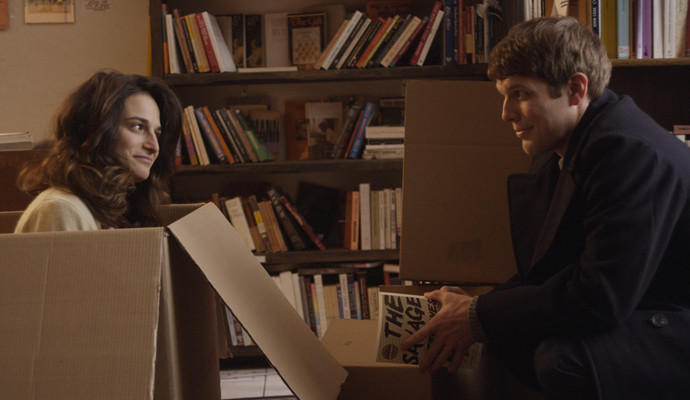Girls on Film: Movies can help defeat society's female body problem
Cinema has the unique ability to destroy long-held misconceptions and prejudices about women — if the right people are behind the camera


A free daily email with the biggest news stories of the day – and the best features from TheWeek.com
You are now subscribed
Your newsletter sign-up was successful
The female body is still not safe in the modern world. It's the subject of domination and mutilation, a horrifying reality that affects 125 million women worldwide. It's a laboratory where politicians play pretend scientist, inventing a nonsense world where women have rape-fetus antibodies that prevent pregnancy. It's the target of assaults that leave countless victims harassed rather than supported. And all the while, culture insists that it must be impossibly sexy, thin, hairless, and generally white. It must be manufactured instead of real — waxed, puffed, injected, sucked, smoothed, and Photoshopped.
When pop culture defines the female body, it becomes a battlefield for personal interests and political agendas that defy Zechariah Chafee's old adage "your right to swing your arms ends just where the other man's nose begins." That phrase was quoted by Ruth Bader Ginsberg herself earlier this week in her dissent of SCOTUS's startling Hobby Lobby decision about health care.
Cinema is a bigger part of the problem than the solution — but this summer has brought a welcome exception. In the new comedy Obvious Child, Donna (Jenny Slate) chooses to have an abortion. It's a decision that frames the film, but is only one of the many ways in which Obvious Child tries to stretch cinema's rigid female boundaries. Writer/director Gillian Robespierre's world is decidedly un-Hollywood. The film is set in the bone-chilling cold of a New York City winter, and its heroine wears layers of knits, doesn't obsess about makeup, and has many important conversations in a graffiti-ridden co-ed bar bathroom.
The Week
Escape your echo chamber. Get the facts behind the news, plus analysis from multiple perspectives.

Sign up for The Week's Free Newsletters
From our morning news briefing to a weekly Good News Newsletter, get the best of The Week delivered directly to your inbox.
From our morning news briefing to a weekly Good News Newsletter, get the best of The Week delivered directly to your inbox.
She is also unabashedly honest. Donna is a stand-up comic who bares her life to her audience, regardless of whether the anecdotes are wildly funny or uncomfortably unsettling. Some, like pubic hair and flatulence, are the unseemly aspects both genders can relate to (though only one gender gets to really talk about it, because women don't fart). Others, like an extended monologue about vaginal discharge, feel outright shocking.
A woman talking about her body with so much candor feels surprising, but it shouldn't. Hollywood has been offering body humor for years — through men. They fart, vomit, sweat, burp, defecate, and ejaculate. They suffer untimely erections, erectile dysfunction, and prostate exams. We're familiar with the pain that comes from being hit in the testicles, and what happens to them when it gets really cold. Exploring the foibles of the male body is normal (and in the realm of comedy, expected).
The female body, however, rarely exists beyond lust and motherhood. In Hollywood's eyes, it's the vessel of sex and beauty — an alluring vision that transcends reality and even sexuality (since lesbian sex scenes are often offered as titillation for straight male audiences). It is not awarded the same biological honesty as the male body, which feeds into a larger ignorance.
One review of Obvious Child begins, "50 percent of the population already knows plenty about vaginal discharge." Unfortunately, that's not the case. Discharge has led real people to fears of gynecological problems and fidelity issues. College-age women "think any amount [of discharge] is a sign of infection," OB-GYN Lissa Rankin told Glamour in 2011, as part of a piece on bodily ignorance in young women. Many women don't know if they've ever had an orgasm, and think there is something wrong with them if they can't have one from intercourse. The 2009 documentary Orgasm Inc. followed the heart-breaking story of a woman who had electrodes surgically threaded near her spinal cord to try and force her body to have orgasms — all because she believed she was abnormal for not having climaxes during intercourse.
A free daily email with the biggest news stories of the day – and the best features from TheWeek.com
You could argue about what, if any, links exist between pop culture and bodily ignorance, but the confusion over the hymen makes the link explicit. The loss of virginity has been creatively framed, for eons, as what's now crudely referred to as the "popping of the cherry" — the ripping of the hymen resulting in blood on the sheets (see, for example, Circle of Friends). In recent years, erotica has not only upheld this belief, but pushed this infamous barrier inward, so that men might penetrate a woman and then feel the restrictive surprise — the sheath that leads to claiming their heroine. Even vagina-possessing female writers have written this inaccuracy with such frequency that there are multiple pieces and movements to set the facts straight, from "A hymen primer for romance novelists" to a Swedish movement to rename the tissue the "corona" to end confusion, because the hymen isn't some sort of umbrella-like membrane, as pop culture has taught us.

The true elements of womanhood that are shared often become radical statements. Showing female pleasure has been a no-no with the MPAA for years, as This Film is Not Yet Rated detailed in its exploration of films like But I'm a Cheerleader. About Schmidt made waves because it dared to show a 54-year-old Kathy Bates naked, and Sarah Polley made waves ten years later when Take This Waltz included a long, mundane full-frontal shower scene featuring Michelle Williams and Sarah Silverman talking while they bathed at the local gym. Monthly menstruation was a source of panic and mockery in Carrie, and a symbol of audacious, feminine revolt in The Runaways. Bridesmaids shocked audiences into laughter by showing women who have gas and bouts of diarrhea.
What many of those films have in common are female filmmakers (and/or writers). There is no biological disposition to good filmmaking, but there is a biological boost for the intimate knowledge of sex-specific experiences. In a world where most films are created by heterosexual men, a male gaze can struggle to see through the cloud of ignorance that surrounds the female experience.
Women creating and influencing cinema helps blast through this ignorance. Some action is literal: Actress Lianne Balaban has co-founded Crankyfest — an online film festival aimed to educate women about menstruation and battle the influence of societies that don't teach women about this bodily inevitability.
Each step is important. Any woman who watches Obvious Child will feel less freakish about what's in her underwear. Every nude scene that shows the ordinariness of the body will challenge our expectation for sexiness and lust. Every film that shows women with diverse sizes will bring us closer to a world where Melissa McCarthy can be celebrated for her talents without being framed by her weight — or worse, being called a "female hippo." Every film that adds in a regular, biological quirk or aspect of the female experience will help to eradicate the silence that makes normalcy feel wrong. Gender doesn't dictate filmmaking, but it does diversify it, coloring cinema with broader insights, experiences, and hooks (along with heaps of really great female characters).
One of C.S. Lewis's most well-known quotes gets to the heart of the issue: "Friendship is born at that moment when one man says to another: 'What! You too? I thought that no one but myself…'" When we relate, we connect. It's a tenet of friendship, and it is also one of cinema. Often movies are made to help us escape, but more universally — in some aspect small or large — they coax us to relate and connect with the work in question. It helps cinema, and it helps society, as long as the voices are heard.
Girls on Film is a weekly column focusing on women and cinema. It can be found at TheWeek.com every Friday morning. And be sure to follow the Girls on Film Twitter feed for additional femme-con.
Monika Bartyzel is a freelance writer and creator of Girls on Film, a weekly look at femme-centric film news and concerns, now appearing at TheWeek.com. Her work has been published on sites including The Atlantic, Movies.com, Moviefone, Collider, and the now-defunct Cinematical, where she was a lead writer and assignment editor.
-
 How the FCC’s ‘equal time’ rule works
How the FCC’s ‘equal time’ rule worksIn the Spotlight The law is at the heart of the Colbert-CBS conflict
-
 What is the endgame in the DHS shutdown?
What is the endgame in the DHS shutdown?Today’s Big Question Democrats want to rein in ICE’s immigration crackdown
-
 ‘Poor time management isn’t just an inconvenience’
‘Poor time management isn’t just an inconvenience’Instant Opinion Opinion, comment and editorials of the day
